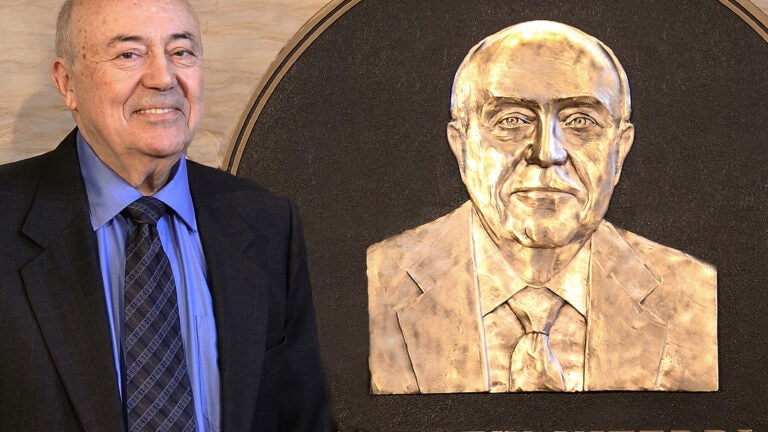
Andrew J. Viterbi will be presented with the prize at a gala dinner in Washington, D.C. (Photo/Ziva Santop/Steve Cohn Photography)
USC Trustee Andrew J. Viterbi to receive prestigious engineering award
The Charles Draper Prize for Engineering recognizes Viterbi’s development of the algorithm that makes clear telecommunications possible
The National Academy of Engineering will award Andrew J. Viterbi, USC trustee, Presidential Chair and professor of electrical engineering systems and namesake of the USC Viterbi School of Engineering, the 2016 Charles Draper Prize for Engineering.
The prestigious distinction is accompanied by a $500,000 award. The citation reads “for development of the Viterbi algorithm, its transformational impact on digital wireless communications, and its significant applications in speech recognition and synthesis and in bioinformatics,” according to the NAE announcement.
Viterbi will be presented with the prize at a gala dinner in Washington, D.C., on Feb. 16.
Andy is such an inspiring role model for our students — and will continue to be so for generations to come.
C. L. Max Nikias
“Andrew Viterbi stands among USC’s most distinguished alumni, and his extraordinary innovations have touched countless lives all over the world,” said USC President C. L. Max Nikias. “His Viterbi algorithm revolutionized how we communicate with one another, whether at home talking on a cellphone or at NASA tracking a spacecraft. This award speaks to his numerous contributions over the last half century and builds on an already stellar legacy in engineering and communications. Andy is such an inspiring role model for our students — and will continue to be so for generations to come.”
NAE President C.D. Mote Jr. added: “Andrew Viterbi’s Viterbi algorithm has led to significant benefits to the health, safety and well-being of the world’s citizens. I am very honored to recognize him with this year’s Draper Prize. His work embodies the prize’s mission to recognize an engineer whose accomplishment has meaningfully impacted society.”
Digital doings
Viterbi is president of the Viterbi Group, which advises and invests in digital communications startups. He is also one of telecom’s early pioneers, without whom modern communications, including cellphones, today taken as essential necessities, would not exist.
In 1962, Viterbi earned one of the first doctorates in electrical engineering granted by USC. Just four years later, he invented the algorithm that bears his name, which he published the following year in IEEE Transactions on Information Theory.
In 1968, together with two colleagues, Viterbi founded Linkabit, which provided software for government computers and technology for defense communications satellites. In 1985, he went on to found Qualcomm, where he created a new technology for cellphone transmissions known as CDMA (Code Division Multiple Access), which allows multiple users to transmit information over a single channel simultaneously — immeasurably boosting a network’s capacity. CDMA was widely adopted and is now a cellphone industry standard.
Teacher to trustee
Viterbi taught at UCLA from 1963 to 1973 and then part-time at the University of California, San Diego, where he remains a professor emeritus. He joined the USC Board of Trustees in 2000 and in 2004 — with his late wife, Erma — gave a $52 million gift to name USC’s engineering school. This gift was followed with another gift of $15 million to support both USC Viterbi through fellowships and endowed chairs and USC Shoah Foundation — The Institute for Visual History and Education in its genocide studies program through an endowed chair for its director.
The algorithm that bears Viterbi’s name improves error-correcting codes by using an outcome to predict the path that led to it. In telecommunications signals, that can help to eliminate static — but the algorithm also has applications across the Internet in everything from speech recognition to bioinformatics to data transmission.
The Draper Prize was established in 1988 to honor the memory of Charles Stark “Doc” Draper, the “father of inertial navigation,” and to increase public understanding of the contributions of engineering and technology.
